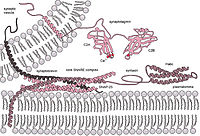
Photo from wikipedia
Mutations in RNA splicing factors commonly occur in myeloid leukemia and solid tumors. These mutations occur in a heterozygous manner and confer dependency on the wild-type allele. Studies have shown… Click to show full abstract
Mutations in RNA splicing factors commonly occur in myeloid leukemia and solid tumors. These mutations occur in a heterozygous manner and confer dependency on the wild-type allele. Studies have shown that splicing factor mutant cancers are vulnerable to further perturbation of splicing, by pharmacological intervention that directly targets core splicing factors. Our project identifies the use of PRMT inhibitors, as plausible alternative therapeutic strategy to treat spliceosomal mutant leukemia. The data show that splicing factor mutant leukemia exhibit greater sensitivity to the use of inhibitors against Type I PRMTs and PRMT5, in comparison to their wild-type counterparts. As the need for new therapeutic strategies in cancer treatment increases, this study identifies PRMT inhibitors as a potential therapeutic intervention against cancers with splicing factor mutations. Citation Format: Jia Yi Fong, Diana Low, Luca Pignata, Kimihito Cojin Kawabata, Stanley CW Lee, Cheryl Koh, Daniele Musiani, Enrico Massignani, Cheng Mun Wun, Pierre-Alexis V. Goy, Yudao Shen, Heike Wollmann, Florence PH Gay, Genna Luciani, Dalia Barsyte, Jian Jin, Ari M. Melnick, Tiziana Bonaldi, Omar Abdel-Wahab, Ernesto Guccione. Therapeutic targeting of RNA splicing through inhibition of protein arginine methylation [abstract]. In: Proceedings of the American Association for Cancer Research Annual Meeting 2019; 2019 Mar 29-Apr 3; Atlanta, GA. Philadelphia (PA): AACR; Cancer Res 2019;79(13 Suppl):Abstract nr 4731.
Journal Title: Cancer Research
Year Published: 2019
Link to full text (if available)
Share on Social Media: Sign Up to like & get
recommendations!